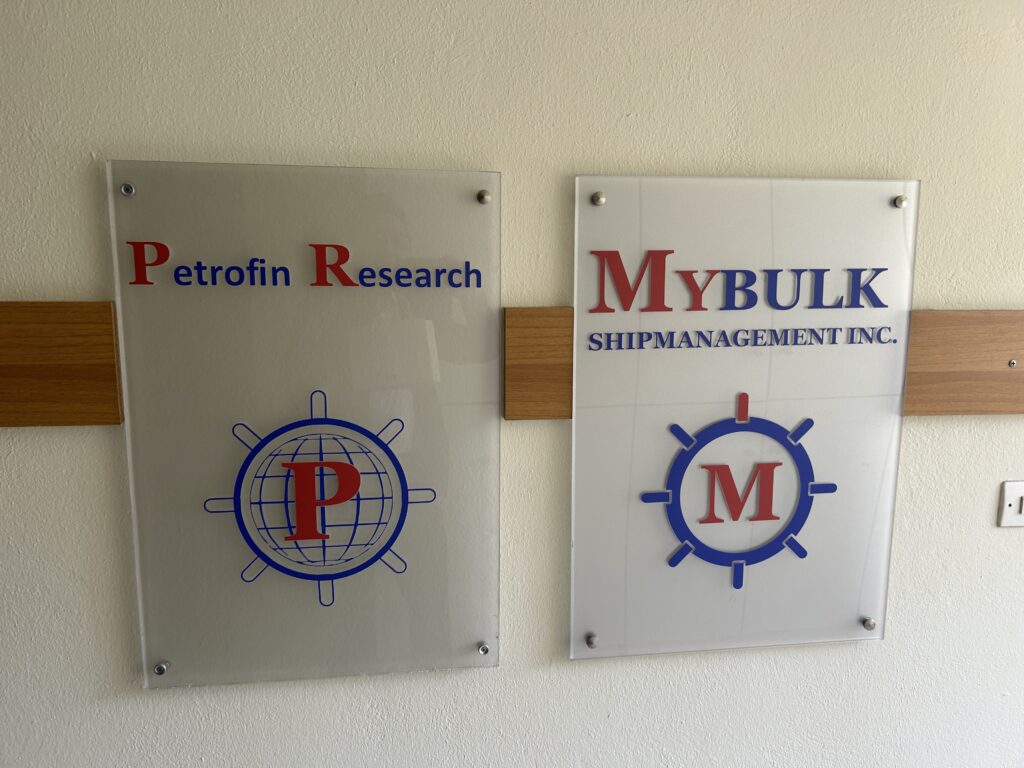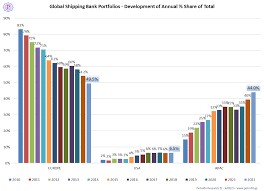〆Petrofin Research plans to increase its efforts in Private Equity Funds data collection and analysis in the future.
Petrofin Research makes all its articles freely available on its website, offering them to international banks and the whole shipping industry. The primary reason behind providing this information at no cost is that Petrofin Research’s representative, Ted Petropoulos, established the company with the goal of contributing to the Greek and International maritime sector and maritime education. Since its inception in 1989, Petrofin Research has engaged in international maritime-related discussions with numerous universities, maritime ministries, banks, and other maritime-related organizations in Greece, the UK, Europe, and the Far East. We spoke with Ted Petropoulos, the representative of Petrofin Research, Manager Isabella Constantinidou, and Data Analyst Roula Kouri.
(Text By Hirofumi Yamamoto)

■Extensive Networks and Experience
―What motivated you to start Petrofin Research?
“Over 30 years ago, we recognized the need for the Greek shipping industry to begin reporting survey information. At that time, there was no research data, and there was a lack of solid information on Greek shipowners and Greek shipping. There were many small pieces of information scattered around, but none were collected as part of research activities. Similarly, there was no information on Greek ship finance. So, we decided to study Greek ship finance. Fortunately, I had previously worked in a bank and later transitioned to the shipping industry, which allowed me to build trust with all the banks. For a long time, Petrofin Research operated as the only Greek ship finance research company in Greece, and it continues to be a major international research company today.”

―What do you think are Petrofin Research’s strengths?
“By reading our continuous research reports, one can compare the changes in Greek ship finance over the past 23 years. We know that many maritime stakeholders regularly check this information, so we decided not to charge a fee to achieve wide cooperation and make a significant impact. In other words, this is a contribution to the shipping industry.”
“One of the other areas of interest of Petrofin Research is analyzing the size and development of Greek companies, and the major changes in the evolution of the Greek fleet. What lies behind the numbers? What drives the evolution of group fleets? Additionally, what causal relationships exist between the increase in the number of operational ships and the increase in shipping companies? How is the fleet age demographic of maritime stakeholders and each group changing? We obtain data from shipping directories like Clarkson’s and the Greek Shipping Directory, other market sources, and sometimes directly from Greek shipowners. In addition to analyzing the numbers, we also provide analyses of the management structure of Greek shipping.”

■Contribution to Greek Shipping
―What prompted you to cover global ship finance?
“About 12 years ago, we realized that while we thoroughly covered the Greek ship finance market, there was an increasing need for information regarding global ship finance. Therefore, we started researching global ship finance. To better understand the Greek shipping index, we publish the Greek and the Global Ship finance Indices and conduct year-over-year comparisons. These are the main areas of our research. We also produce articles, presentations, and discussions on various aspects such as Greek shipping, international ship finance, and public companies.”
―What about the information on banks and ship finance in Asia, including Japan?**
“Obtaining ship finance figures from Asian banks differed from European banks. The reason is that Far Eastern banks were not accustomed to reporting their portfolios. However, this issue has been decreasing recently. More banks are starting to share information with us. Additionally, we are connected with maritime trade publications like yours, which further aids in information exchange.”

■Information Collection on Funds
―Recently, there have been cases where new ships are built using funds from shipping funds. How are you researching fund capital trends?
“We aim to research funds as much as possible. Funds provide competitive capital, but how large is their scale? What percentage of the Greek fleet is financed by funds? Financing from funds is growing very rapidly, much faster than bank loans. Therefore, to get a complete picture, we need to spend time investigating this area. Many transactions are private, so we may not be able to get all the information.”
“On the other hand, we might be able to gather information collectively. While funds may not share specific cases, they might tell us the amount they have lent. Of course, I have many connections in the funds industry. Some funds are cooperative, while others are not. This is exactly the situation we faced when we started our research 23 years ago. It is a kind of evolution.”

“Over time, funds will understand that this list is useful to them from a publicity point of view. It may take a few years to compare specific data, but we aim to have funds regularly report data to us. By combining information on bank loans, funds, exports, and finance, we want to create easy-to-search figures for Greek and global ship finance. Once we understand the total amount of global ship finance, we will compare it with the fleet’s value. We want to see how leveraged the fleet is and examine leverage in the LNG and tanker sectors.”
―Why does your company make Petrofin Research available for free instead of charging for it?
“In addition to Petrofin Research, my family owns bulk carriers and a ship management company called MYBULK. Petrofin Research is the research arm of the group. This is precisely one of our ways of contributing to the shipping industry.”
■Ted Petropoulos
He has made numerous presentations at shipping conferences and shipping training courses in the UK, Greece, Cyprus, etc, since 1992, as well as provided articles and interviews to leading financial and shipping organizations and publications since the 1980s, such as Bloomberg, Lloyd’s List, Lloyd’s Shipping Economist, Trade Winds, Seatrade, Nafs, Naftiliaki, Outlook, Naftika Chronika, Ship Manager International, Fairplay, Bimco, International Chamber of Commerce, Marine Money, Shipping Finance, Financial Times, Greek dailies, Shipping websites, and others.
〆ペトロフィン・バンク・リサーチは、ギリシャの海運および船舶金融の研究と分析に関する情報を無料で提供することで、世界的に広く認知されています。
ペトロフィン・リサーチは、今後プライベートエクイティファンドのデータ収集と分析に力を入れる計画です。
ペトロフィンリサーチ(本社・アテネ)はギリシャを代表する海運の船舶金融調査会社である。同社はすべての記事をウェブサイトで無料で公開し、国際銀行や海運業界全体に提供する。情報を無償で提供する理由は、ペトロフィン・リサーチの代表であるテッド・ペトロポウロスが、ギリシャおよび国際的な海運業界と海運教育に貢献することを目的として会社を設立したことにある。1989年の創業以来、ペトロフィン・リサーチはギリシャ、英国、ヨーロッパ、極東の多くの大学、海運の担当省庁、銀行、その他の海運関連組織とともに、国際的な海運に関する議論を行ってきた。ペトロフィン・リサーチのペトロフィン・リサーチリサーチチチウロス、マネージャーのイザベラ・コンスタンティニドウ、データアナリストのルーラ・コウリにペトロフィン・リサーチの今後の展望について聞いた。
(聞き手 山本裕史)
